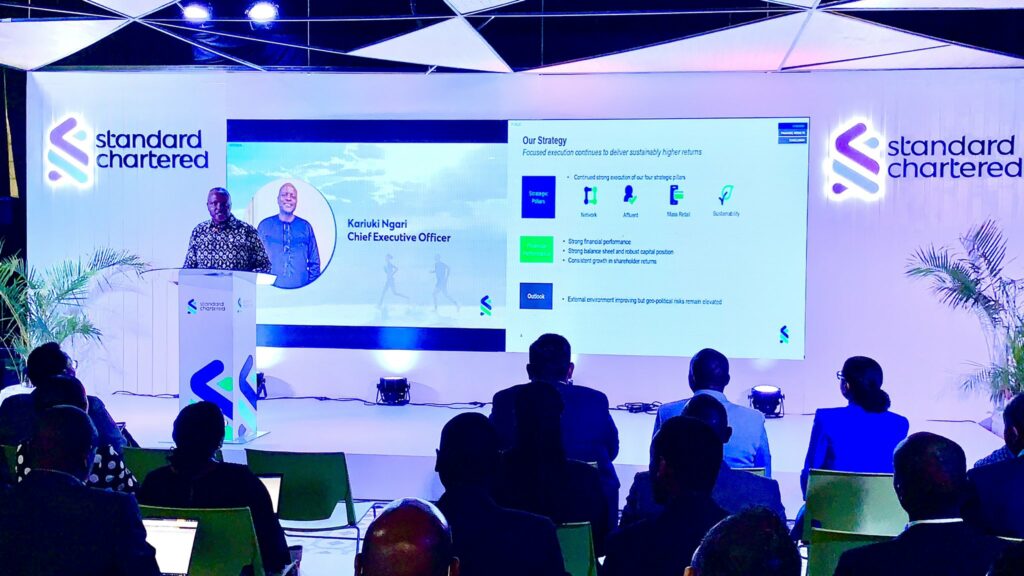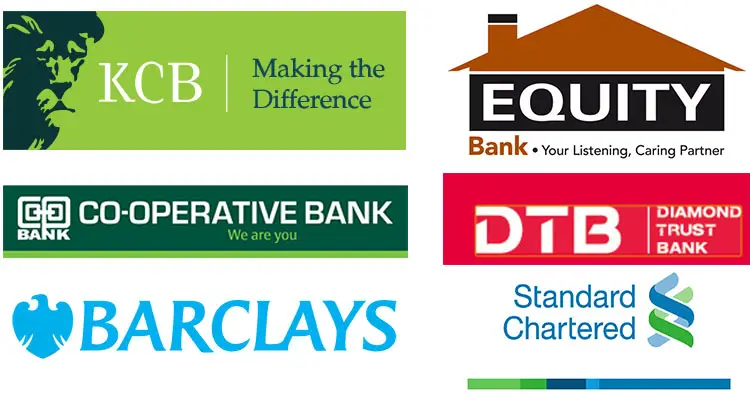Business & Money
Standard Chartered Bank Kenya Achieves 39.5% Profit Surge in Q1 2024
The bank intends to keep investing in digital innovation, broadening its product offerings, and solidifying its market presence throughout Kenya. Focusing on a customer-centric approach and staying agile in response to evolving regulatory demands will be essential for overcoming future challenges and capturing new growth opportunities.

: Standard Chartered Bank Kenya charts a bold future with strategic investments in digital Innovation, expanded product offerings, and enhanced market presence amidst regulatory evolution
By Charles Wachira
In a significant financial achievement, Standard Chartered Bank Kenya reported a remarkable 39.5% increase in profits for the first quarter of 2024, totaling KSh 5.62 billion (US$43,502,801) compared to KSh 4.03 billion (US$31,195,069) in the same period last year. This robust performance highlights the bank’s resilience and underscores its strategic initiatives amidst a dynamic economic landscape.
Factors Driving Profit Growth
1. Strong Revenue Generation
The main reason for Standard Chartered Bank Kenya’s profit explosion is the company’s strong revenue generation across a range of industry sectors. Thanks to careful portfolio management and smart pricing tactics in an environment with favourable interest rates, the bank has been able to capitalize on increased interest income.
2. Cost Management Efficiencies
Efficient cost management has played a crucial role in enhancing profitability. Despite economic uncertainties, the bank’s proactive approach to optimising operational efficiencies and controlling costs has expanded profit margins.
3. Diversified Product Offerings
The bank’s diversified product offerings, including innovative digital banking solutions and tailored financial products, have resonated well with retail and corporate clients. This diversification strategy has attracted new customers and strengthened existing relationships, thereby boosting overall revenue streams.
4. Strategic Investments and Partnerships
Strategic investments in technology and partnerships with fintech firms have bolstered Standard Chartered Bank Kenya’s market position. These initiatives have enabled the bank to enhance service delivery, improve the customer experience, and tap into new growth opportunities in digital banking.
Economic and Market Analysis
Standard Chartered Bank Kenya’s impressive financial results amid a recovering economy and evolving regulatory landscape reflect its adept navigation of challenges and strategic positioning. The bank has benefited from Kenya’s economic recovery. Improved business sentiment and consumer spending have led to higher loan demand and increased transaction volumes. Furthermore, the bank’s proactive risk management practices have shielded it from potential credit risks, ensuring a healthy loan book and sustainable profitability. This disciplined approach has safeguarded the bank’s financial stability and instilled confidence among investors and stakeholders.
Future Outlook and Strategic Imperatives
Standard Chartered Bank Kenya remains cautiously optimistic about sustaining its growth trajectory. The bank plans to continue investing in digital innovation, expanding its product offerings, and strengthening its market presence across Kenya. Maintaining a customer-centric approach and adapting to evolving regulatory requirements will also be critical in navigating future challenges and seizing new growth opportunities.
In conclusion, Standard Chartered Bank Kenya’s significant profit increase in Q1 2024 underscores its strong fundamentals, strategic foresight, and operational resilience. As the bank continues to innovate and optimise its business operations, it is well-positioned to capitalise on Kenya’s economic recovery and drive sustainable long-term growth in the banking sector.
Keywords:Profit Growth:Revenue Generation:Cost Management Efficiencies:Digital Banking Solutions:Strategic Investments
Business & Money
KCB Group Surpasses Equity with US$ 342.31 Million Nine-Month Profit

: KCB Group reports Sh44.5B ( US$ 342.31) nine-month profit, outpacing
Equity Bank. Learn about its 49% growth, challenges, and stock performance this
year.
KCB Group Plc has outperformed Equity Bank to cement its position as Kenya’s leading
lender, posting a net profit of Sh44.5 billion for the nine months ending September
This represents a 49% year-on-year growth, surpassing Equity Bank’s Sh37.5
billion profit during the same period.
Profit Growth Driven by Core Business Performance
The remarkable profit growth was fueled by higher earnings from both interest and non-
interest income streams. KCB’s diverse revenue base has been pivotal in maintaining
its dominance in the competitive banking sector.
Non-Performing Loans a Key Concern
Despite the impressive profit growth, KCB’s non-performing loan (NPL) ratio rose to
18.5%, compared to 16.5% last year. This increase highlights persistent challenges in
managing credit risk, with Chief Financial Officer Lawrence Kimathi acknowledging it as
a “pain point” for the bank.
KCB Stock Outshines Peers on NSE
KCB’s strong financial performance has translated into exceptional stock market results.
The bank’s stock has risen 78.8% year-to-date, making it the best-performing banking
stock on the Nairobi Securities Exchange (NSE).
Plans to Sell National Bank of Kenya
Earlier this year, KCB announced plans to sell its struggling subsidiary, National Bank of
Kenya (NBK), to Nigeria’s Access Bank. While Nigerian regulators have approved the
deal, it is still awaiting clearance from Kenya’s Central Bank. The sale aims to
streamline KCB’s operations and address losses at NBK.
CEO Paul Russo Optimistic About Year-End Performance
“The journey has not been without its hurdles, but our ability to walk alongside our
customers has driven our success,” said KCB CEO Paul Russo. He expressed
confidence in closing the year on a high note, leveraging improving economic conditions
across the region.
Key Figures at a Glance
● Net Profit: Sh44.5 billion (+49%)
● Non-Performing Loan Ratio: 18.5% (up from 16.5%)
● Stock Performance: +78.8% year-to-date
KCB’s strong performance underscores its resilience in navigating challenges and its
commitment to sustaining growth in Kenya’s banking sector.
Business & Money
Top 10 Kenyan banks by total assets as of 2023, based on data from the Central Bank of Kenya:

KCB Bank Kenya Limited
Total Assets: KSh 1.425 trillion
Market Share: 17.4%
Equity Bank Kenya Limited
Total Assets: KSh 1.004 trillion
Market Share: 12.2%
NCBA Bank Kenya PLC
Total Assets: KSh 661.7 billion
Market Share: 9.2%
Co-operative Bank of Kenya
Total Assets: KSh 624.3 billion
Market Share: 8.8%
Absa Bank Kenya PLC
Total Assets: KSh 520.3 billion
Market Share: 6.6%
Standard Chartered Bank Kenya
Total Assets: KSh 429.3 billion
Market Share: 5.9%
Stanbic Bank Kenya
Total Assets: KSh 449.6 billion
Market Share: 5.8%
I&M Bank Limited
Total Assets: KSh 405.6 billion
Market Share: 5.4%
Diamond Trust Bank Kenya
Total Assets: KSh 399.6 billion
Market Share: 5.3%
Bank of Baroda (Kenya) Limited
Total Assets: KSh 201.9 billion
Market Share: 2.8%
These rankings illustrate the dominance of large Tier 1 banks, which collectively control over
76% of the market share. Strategic expansions, increased deposit mobilisation, and robust
lending practices underpin the sector’s strong performance
Business & Money
Vasundhara Oswal’s Legal Struggles and Family’s Plea for Justice

: Vasundhara Oswal, daughter of industrialist Pankaj Oswal, faces serious
charges in Uganda. The Oswals call for UN intervention amid claims of corporate
jealousy.
Vasundhara Oswal, the 26-year-old daughter of prominent Swiss-Indian industrialist
Pankaj Oswal, has found herself at the centre of a legal storm in Uganda.
Her father, a well-established business figure, is known for his diverse investments,
most notably a $150 million ethanol plant in Uganda.
This plant, the largest of its kind in East Africa, is a key part of Oswal’s broader strategy
to invest in industrial and eco-friendly solutions in the region. The facility produces extra-neutral alcohol (ENA), which is used in the beverage, cosmetics, and pharmaceutical industries.
It is recognised for its modern technology and sustainable practices, such as zero liquid
discharge, emphasising the Oswal family’s commitment to both industrial growth and
environmental responsibility.
In addition to the ethanol plant, Pankaj Oswal has made strategic investments across
various industries, including petrochemicals, agriculture, and real estate.
His ventures reflect a global reach, extending to Australia and India, where he has
been involved in industries ranging from agriculture to renewable energy.
His diversified business approach and commitment to sustainability have made him a prominent figure in international business. However, in October 2024, the family’s legacy was overshadowed by the legal troubles surrounding Vasundhara Oswal.
She was detained on October 1, 2024, after being accused of involvement in the
alleged murder of Mukesh Menaria, a former employee who had worked with the
Oswals since 2017.
Menaria had accused the family of harassment but later testified under oath that they
had not harmed him Despite this, charges of kidnapping and murder were brought against Vasundhara.
Her family has strongly denied these allegations, claiming that the charges are
politically motivated and part of a larger conspiracy orchestrated by their business rivals
in collaboration with corrupt officials in Uganda.
The Oswals have appealed to the United Nations, seeking intervention and asserting
that the legal proceedings against Vasundhara are unlawful. Vasundhara has actively managed the family business throughout her career, especially the ethanol plant, and led the company’s sustainable initiatives.
Beyond her business involvement, she has also been an advocate for community
welfare and mental health, further cementing the Oswal family’s reputation for corporate
social responsibility.
The unfolding legal drama has raised important questions about the intersection of
business, politics, and the legal systems in Uganda.
While the Oswal family’s ventures reflect a blend of industrial innovation and social
responsibility, the legal challenges Vasundhara faces have cast a shadow over their
business empire, highlighting the complex dynamics at play in East Africa.
-

 Business & Money8 months ago
Business & Money8 months agoEquity Group Announces Kshs 15.1 Billion Dividend Amid Strong Performance
-

 Politics3 months ago
Politics3 months agoFred Okengo Matiang’i vs. President William Ruto: A 2027 Election Showdown
-

 Politics2 months ago
Politics2 months agoIchung’wah Faces Mt. Kenya Backlash Over Gachagua Impeachment Support
-

 Politics4 months ago
Politics4 months agoPresident Ruto’s Bold Cabinet Dismissal Sparks Hope for Change
-

 Politics5 months ago
Politics5 months agoKenya Grapples with Investor Confidence Crisis Amid Tax Protest Fallout
-

 Politics5 months ago
Politics5 months agoPresident Ruto’s Lavish Spending Amid Kenya’s Economic Struggles Sparks Outrage
-

 Politics4 months ago
Politics4 months agoJohn Mbadi Takes Over Kenya’s Treasury: Challenges Ahead
-

 Business & Money1 week ago
Business & Money1 week agoMeet Kariuki Ngari: Standard Chartered Bank’s new CEO of Africa. What’s Next?





